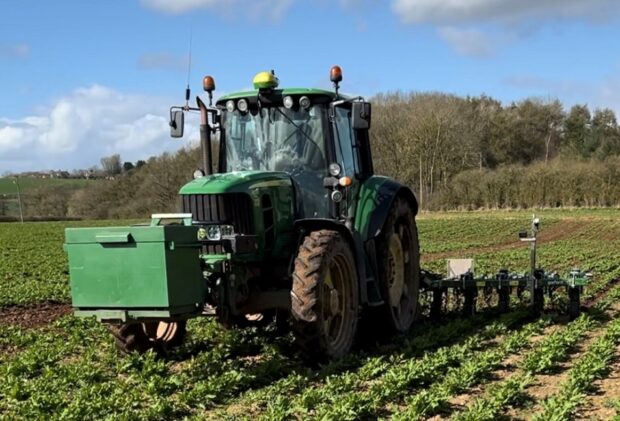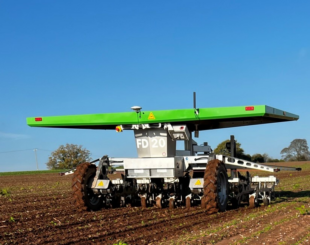
RPA offers a wide range of grants rural payments to farmers and businesses. In this blog, RPA talks to farmer Jim Bubb, on how the Improving Farm Productivity grant has made his business more efficient with the addition of droid robots.
J M Bubb and Son is a fourth-generation arable farming business growing potatoes, oilseed rape and wheat across 420 hectares. As part of the business, Shropshire Petals grows a wide range of sustainable petal confetti for weddings and dried flowers for home décor and gifts. The flowers are grown during the summer months and picked by hand, then dried on the Shropshire farm, from which they’re then delivered worldwide.

Owner Jim Bubb applied for a Farming Transformation Fund (FTF) grant and was successful in his bid to purchase two farm droid robots to plant flowers and weed around them, with an FTF Grant contribution of £50,538 (40% intervention).
Before the arrival of the droids, the flowers were planted by hand or tractor with many hours spent weeding by hand. The droids now drill and manage 20 hectares of flowers - where they weed and drill the field completely, powered by four large solar panels that provide enough energy to keep the robots working for 18-25 hours, with no need to stop to refuel or charge.
Jim said:
No other business has used the farm droids to plant flowers before and therefore this is a world first. They’ve also reduced our CO2 emissions as there’s no need for tractors and fuel. The two robots have taken our weeding bill from around £20,000 plus, down to nearly £5,000 in one year alone. They’re lighter than tractors which reduces the risk of compaction, allows earthworms to function better and improves the soil condition. They use high precision GPS to know the position of every single seed they plant and therefore can take out unwanted weeds that would otherwise stifle the growth of the flowers.
The project has enabled us to make improvements in sustainability, reduce our carbon footprint and harnesses natural energy to produce crops. I can see that we could potentially have a swarm of robots in the years to come. I'm not quite sure how it will work, but we have to accept technology is here to stay and we have to embrace it and help evolve and make it useful for the future. Because these robots work solely off solar power, they can run 24/7, don’t need a break and their accuracy is ten times more than any tractor – so there's definitely a future in this sort of machinery.
The machines have increased the quality of the flowers that Shropshire Petals is growing, and they’ve also seen some improvement in the yield and because of the increased accuracy of weeding, they’ve been able to reduce the use of herbicides. The robots weed the flower fields continually once the planting is complete and therefore weeds will never grow big enough to out-compete the flower plants.
He added:
It’s certainly made us look at things in a different light. In theory it’s very simple – it's a combination of three or four different bits of technology that have come together to automate a process in the field which is definitely saving us labour and increasing the quality of the product that we’re able to grow.
Jim added that Shropshire Petals were also currently looking at other grants as they were considering installing a new processing facility, looking at new products for their flower petals as well as a new, more efficient dispatch area, to ensure they can get the end product to customers at the best price possible.
1 comment
Comment by Allan McBain posted on
Excellent stuff.
It's obvious that this technology is not only better for the business but is providing direct environmental benefits. The degree to which the Agency is helping deliver Net Zero through enabling this type of investment will be massive and we could do with publicising it more as it's a tangible outcome from the outputs we produce - when we press buttons to accept a claim or make a payment, this is what we're really doing, this is the change we are delivering.